Interested in a weight loss journey where your main food is neither boring nor bland, but full of flavor and good for you. If you’re looking for a tasty way to lose a few pounds, you’ve hit the jackpot. Welcome to our blog about broccoli. We’re here to answer the big question, ‘Can broccoli help you lose weight?’
Discover the science, try out our delicious recipes, and see how this simple green veg can change your approach to weight loss. Let’s start a new chapter in your health story with a journey that’s both tasty and nutritious.
Related articles
- Are Sweet Potatoes Good for Weight Loss? Explore the Benefits.
- Do Almonds Help You Lose Weight? Health Benefits and Risks.
- Can Avocado Help You Lose Weight? The Reality Check.
Does Broccoli Help You Lose Weight?
Certainly! Broccoli is indeed a fantastic addition to your diet if you’re aiming to shed some extra pounds. Here’s why:
- Low in Calories, High in Fiber: Broccoli is a non-starchy vegetable that’s low in calories but packed with fiber. This combination is excellent for weight management. The fiber helps you feel full for longer periods because it slows down digestion. As a result, you’re less likely to indulge in high-calorie or processed foods.
- Boosts Metabolism: Broccoli has a high TEF, or thermic effect of food. This means that it can actually increase your metabolic rate after you eat it. Your body burns more calories during digestion, which can contribute to weight loss over time.
- Fights Inflammation: Obesity is often linked to chronic inflammation in the body. Broccoli is part of the cruciferous vegetable family, known for its high antioxidant content. These antioxidants can help combat inflammation, promoting overall health and potentially aiding in weight management.
- Improves Insulin Sensitivity: Some studies suggest that consuming cruciferous vegetables like broccoli may enhance insulin sensitivity. Improved insulin sensitivity can assist in better blood sugar control, making it easier to maintain a healthy weight.
- Curbs Appetite: While the evidence isn’t conclusive, there is some indication that including broccoli in your diet may reduce appetite levels. Feeling less hungry can be a significant advantage when you’re trying to cut down on calories.
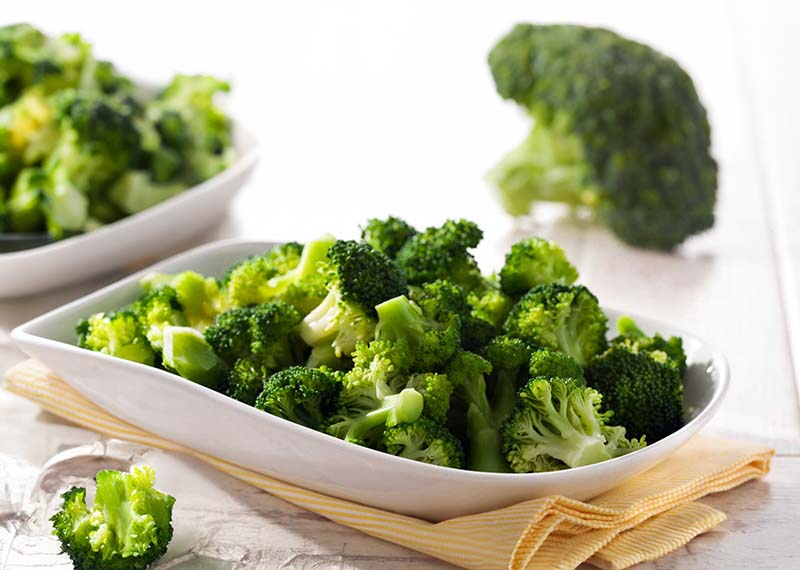
Broccoli Nutritional Information
Absolutely, let’s take a closer look at the nutritional goodness of raw broccoli. Understanding its nutritional profile can help you make informed choices for a healthier diet. Here’s what you need to know:
- Water Content: Raw broccoli is composed of almost 90% water, making it a hydrating choice.
- Calorie Count: One cup (90 grams) of raw broccoli contains a mere 35 calories, which makes it a fantastic option for those looking to manage their weight.
- Protein: Despite its low-calorie nature, broccoli offers a surprising 2.3 grams of protein per cup. This can be valuable for those seeking plant-based protein sources.
- Carbohydrates: Raw broccoli is low in carbs, providing 5.6 grams per cup. It’s an excellent choice for low-carb or keto diets.
- Fiber: Broccoli is rich in fiber, with 2.2 grams per cup. Fiber aids digestion, keeps you feeling full, and supports overall gut health.
- Fat: Broccoli is almost fat-free, with just 0.3 grams per cup.
- Vitamins and Minerals: Broccoli is a nutritional powerhouse, offering impressive amounts of essential nutrients:
- Vitamin C: A cup of broccoli delivers a whopping 91% of your Daily Value (DV) for vitamin C, which is crucial for immune health and skin.
- Vitamin K: You get 77% of the DV for vitamin K, vital for blood clotting and bone health.
- Folate: Broccoli provides 15% of the DV for folate, a B-vitamin important for cell division.
Additionally, broccoli contains small amounts of potassium, magnesium, iron, and calcium, contributing to overall health.
Benefits Of Broccoli for Weight Loss
Absolutely, broccoli offers several weight loss benefits that can complement your efforts to achieve a healthier lifestyle. Let’s delve into these advantages:
Low in Calories: A serving of cooked broccoli typically contains between 50 and 65 calories per serving, and about 39 calories per 100 grams. This positions it as a low-calorie food, making it a valuable addition to your weight loss regimen. To lose weight effectively, you need to create a calorie deficit by burning more calories than you consume.
Rich in Dietary Fiber: Broccoli is an excellent source of dietary fiber, with 3.3 grams per 100 grams. Fiber has a remarkable ability to absorb water, increasing the volume of food in your stomach. This, in turn, promotes a feeling of fullness, curbing your appetite and reducing the urge for mid-meal snacking.
Vitamin C for Fat Burning: Broccoli is packed with vitamin C, which can aid in fat metabolism. Vitamin C supports the breakdown of stored fat, potentially contributing to weight loss. It also plays a crucial role in enhancing your immune system and maintaining healthy skin and hair.
Beneficial Vitamin K: Vitamin K, found in broccoli, is particularly advantageous for glucose and fat metabolism. It can be especially helpful in targeting belly fat, a stubborn area for many individuals.
Carotenoids for Fat Burning: Broccoli contains carotenoids, natural plant compounds that can stimulate fat burning. This property can be a valuable asset in your journey towards shedding excess weight.
Hydration and Metabolism: With its high water content of 90%, broccoli is an excellent food for supporting a healthy metabolism and ensuring you stay adequately hydrated. A well-functioning metabolism is essential for efficient calorie burning.
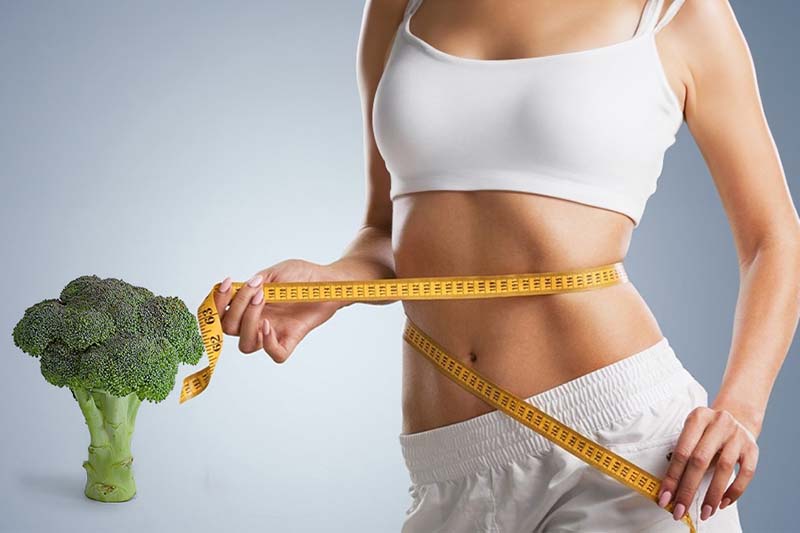
Extra Health Advantages Of Broccoli
Indeed, broccoli is a nutritional powerhouse with a wide range of health benefits beyond just weight management. Here are some of the extra health advantages it offers:
Reduce Inflammation
Research indicates that broccoli may have anti-inflammatory effects, primarily due to the presence of sulforaphane, a potent antioxidant.
Sulforaphane has been shown to reduce inflammation markers in laboratory tests, suggesting that the nutrients in broccoli can play a role in combating inflammation in the body.

Improved Vision
Broccoli is rich in vitamin A and antioxidants, both of which contribute to eye health. Regular consumption of broccoli can help promote healthy vision and may even reduce the risk of age-related macular degeneration and cataracts.

Fight Cancer
Broccoli is packed with antioxidants, including sulforaphane, which has been associated with cancer prevention. These antioxidants help protect cells from damage and may inhibit the growth of cancerous cells, making broccoli a valuable addition to your anti-cancer diet.
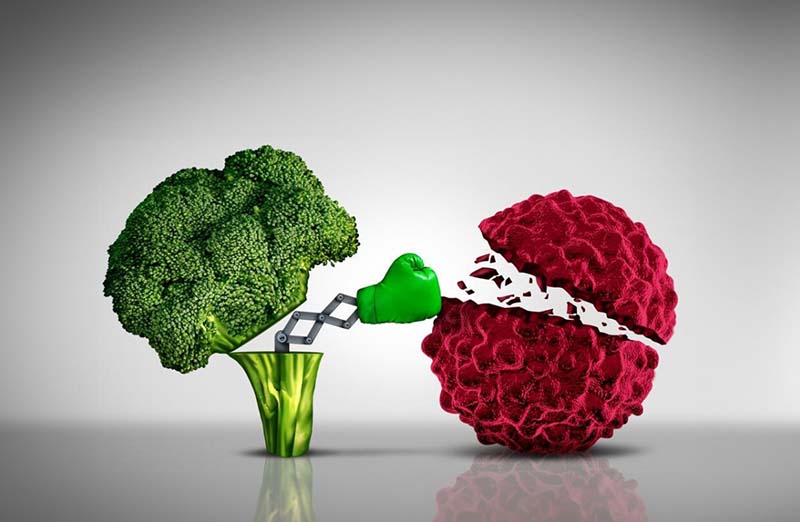
Enhance Cardiovascular Health
Cruciferous vegetables like broccoli can promote cardiovascular health by improving blood flow and supporting heart health. Studies have shown that incorporating broccoli into your diet can help relax blood vessels, which in turn can contribute to lower blood pressure.

Reduce Cholesterol Levels
Broccoli is a rich source of soluble fiber, which plays a vital role in lowering cholesterol levels. The fiber in broccoli binds with bile acids during digestion, aiding in the removal of cholesterol from the body. This natural process makes it easier for your body to eliminate cholesterol, promoting heart health.
Potential Adverse Effects Of Broccoli
While broccoli is undeniably a nutrient-rich vegetable with a host of health benefits, it’s essential to be aware of potential adverse effects, particularly when consumed in excess or by individuals with specific health conditions. Here are a couple of potential adverse effects of broccoli to keep in mind:
- Digestive Discomfort: Broccoli, like other cruciferous vegetables, contains a substantial amount of fiber. While fiber is generally beneficial for digestion, consuming high quantities of broccoli may lead to flatulence or irritation in the bowels. This can be particularly noticeable if you’re not accustomed to a high-fiber diet. To mitigate this effect, it’s advisable to introduce broccoli gradually into your diet if you’re not accustomed to consuming fiber-rich foods.
- Blood Pressure and Bleeding Risks: Broccoli is a rich source of potassium and vitamin K. While these nutrients are beneficial for many, excessive consumption of broccoli can have adverse effects on certain individuals. For those on blood thinners or medications that affect blood clotting, excessive vitamin K intake can increase the risk of bleeding. Additionally, the high potassium content in broccoli can potentially lower blood pressure, which may not be suitable for individuals with already low blood pressure or those taking medications to control hypertension. It’s important for such individuals to monitor their intake of high-potassium foods like broccoli and consult with a healthcare professional for personalized guidance.
If you experience digestive discomfort when consuming broccoli, consider cooking it lightly or steaming it, as this can make it gentler on the stomach. Also, as with any dietary change or if you have specific health concerns, it’s advisable to consult with a healthcare provider or a registered dietitian who can offer personalized guidance based on your individual health status and dietary needs.
7 Quick And Tasty Broccoli Recipes For Weight Loss
Here are seven quick and delicious broccoli recipes that can support your weight loss goals while tantalizing your taste buds:
- Broccoli and Cheese Frittata: Start your day right with a nutritious breakfast. Chop up broccoli and mix it with eggs, cheese, and your favorite spices. Cook this mixture in a skillet or oven for a tasty frittata.
- Broccoli Soup: For a comforting and quick meal, puree cooked broccoli with chicken or vegetable broth, garlic, and your preferred spices. A warm and satisfying soup is ready in minutes.
- Broccoli and Chicken Stir-Fry: Create a speedy and savory stir-fry by cooking chicken breast and broccoli in a wok or large skillet with a touch of oil, minced garlic, and ginger. This dish is high in protein and flavor.
- Roasted Broccoli: Enhance the natural flavors of broccoli by roasting it. Toss broccoli florets with olive oil, a pinch of salt, and your preferred spices, then roast in the oven for 10-15 minutes until they turn crispy and delightful.
- Broccoli and Avocado Salad: Enjoy a refreshing salad by chopping broccoli and ripe avocado, then dressing them with a vinaigrette made from your favorite ingredients. Perfect for a light lunch or dinner.
- Broccoli and Sausage Skillet: Create a hearty and filling weeknight dinner by cooking sausage and broccoli together in a large skillet. Add some oil and spices for extra flavor. It’s a satisfying meal for those busy evenings.
- Broccoli and Tofu Stir-Fry: For a wholesome vegetarian option packed with protein and fiber, stir-fry tofu and broccoli in a wok or large skillet. Use a bit of oil, garlic, and ginger to infuse flavors into this delightful dish.
Notes:
- You can adjust the ingredients and seasonings in these recipes to suit your personal taste and dietary preferences.
- Remember to practice portion control to manage calorie intake effectively, which is crucial for weight loss.
- Pair these broccoli recipes with a balanced diet and regular physical activity for optimal weight loss results.
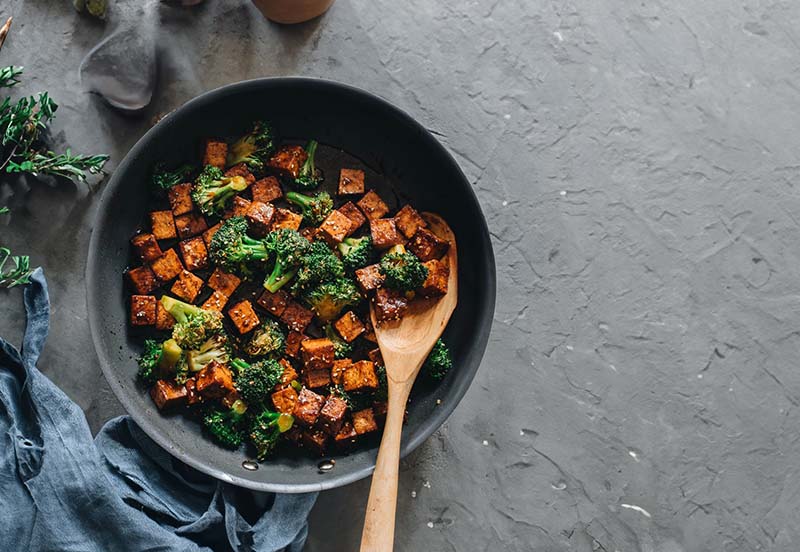
How Much Broccoli Should I Eat To Lose Weight?
Adding broccoli into your weight loss diet is a smart choice due to its numerous health benefits, but it’s important to understand how much broccoli you should consume to support your weight loss goals.
- Frequency: Eating broccoli 2-3 times a week is a reasonable goal to aim for. This allows you to benefit from its nutritional advantages without overwhelming your diet with a single food item.
- Quantity: Target consuming about 400 grams (approximately 14 ounces) of broccoli in a week. This amount provides a substantial contribution to your overall vegetable intake without being excessive.
- Daily Vegetable Intake: It’s important to remember that while broccoli is beneficial, a balanced diet should include a variety of fruits and vegetables. Experts recommend adults consume at least two to four cups of vegetables daily. Your specific vegetable needs may vary based on factors like sex, height, weight, and activity level.
- Variety: To maximize the health benefits and nutrients in your diet, include a diverse range of vegetables alongside broccoli. Different vegetables offer various vitamins, minerals, and antioxidants that contribute to overall health and well-being.
- Balanced Diet: While broccoli can be a valuable component of your weight loss plan, it’s just one piece of the puzzle. A successful weight loss strategy should encompass a balanced diet that includes lean proteins, whole grains, healthy fats, and regular physical activity.
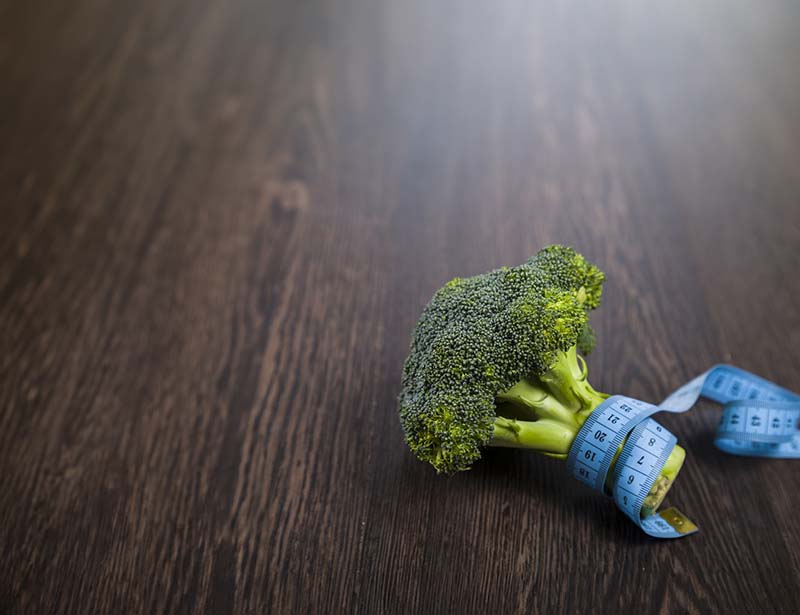
Notes:
- Remember that portion control is key for effective weight loss. Be mindful of the overall calorie intake and maintain a balanced diet that meets your nutritional needs.
- Incorporate other weight-loss-friendly foods into your diet, such as lean proteins like chicken and fish, whole grains like brown rice and quinoa, and healthy fats like avocados and nuts.
Conclusion
In conclusion, broccoli can be your ally on your weight loss journey. Its low-calorie, high-fiber nature, combined with an array of health benefits, makes it a valuable addition to your diet. So, does broccoli help you lose weight? Absolutely! But remember, it’s not just about the pounds; it’s about embracing a healthier lifestyle.
Have your own broccoli success story or a favorite recipe to share? We’d love to hear from you! Feel free to drop your thoughts and experiences in the comments below.
And if you’re hungry for more tips on wellness, nutrition, and beauty, be sure to check out more blogs from Blonde Beauty. Your path to a healthier, more beautiful you continues right here.

Laureate Professor Clare Collins
Professor Clare Collins is a leading expert in nutrition and dietetics at the School of Health Sciences, part of the College of Health, Medicine and Wellbeing. Her work is changing the way we think about food and health. She grew up as one of nine children and was the first in her family to finish high school and go to college. This background gave her a strong work ethic and a deep appreciation for seizing opportunities.
As the Director of the Hunter Medical Research Institute’s Food and Nutrition Program and a recipient of three NHMRC Research Fellowships, Professor Collins is making a big difference in public health. She focuses on helping people who are often overlooked, using new technologies like apps and online programs to improve their nutrition and reduce the risk of chronic diseases.
Professor Collins is well-respected and has been recognized as a Fellow in four major health and science organizations. She leads a diverse team of experts, including dietitians, computer scientists, and engineers, working together on global health projects.
Her achievements are impressive. She has received over $29 million in research funding, published more than 450 papers, and helped 35 PhD and Master’s students complete their degrees. She’s also active in sharing her knowledge with the public. She has developed tools like the Australian Eating Survey and the Healthy Eating Quiz, and she often appears in the media to talk about nutrition.
PUBLISHED ARTICLES
- Collins, C. (2019). “The Effect of a Pilot Dietary Intervention on Pain Outcomes in Patients Attending a Tertiary Pain Service.”
- Collins, C. (2022). “Variation in cardiovascular disease risk factors among older adults.”
- Collins, C. (2022). “Evaluation of an online intervention for improving stroke survivors’ health-related quality of life: A randomised controlled trial.”
These articles show Professor Collins’s commitment to understanding how better nutrition can improve health. Her work is important for researchers, doctors, and anyone interested in healthy living.
